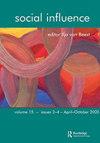网络敌意假说:穆斯林在网络媒体中的表现
IF 0.6
3区 心理学
Q3 PSYCHOLOGY, SOCIAL
引用次数: 0
摘要
本文利用八个欧洲国家在线媒体内容的大型数据集,扩大了对在线敌意假设的实证调查,该假设认为,在博客和论坛等社交网站上的互动比在线下或编辑新闻媒体上的社交互动包含更多对少数群体的敌意表达。总体而言,在比较新闻媒体内容和社交网站时,我们的结果与网络敌意假设一致,但我们发现,在这两种媒体类型中,带负电荷的表征都很常见。相反,在社交网站上对穆斯林和伊斯兰教的关注程度是最明显不同的,也是更广泛意义上的网络媒体环境中网络敌意的主要驱动因素。本文章由计算机程序翻译,如有差异,请以英文原文为准。
The online hostility hypothesis: representations of Muslims in online media
Using a large data set of online media content in eight European countries, this paper broadens the empirical investigation of the online hostility hypothesis, which posits that interactions on social sites such as blogs and forums contain more hostile expressions toward minority groups than social interactions offline or in editorial news media. Overall, our results are consistent with the online hostility hypothesis when comparing news media content with social sites, but we find that negatively charged representations are common in both media types. It is instead the amount of attention to Muslims and Islam on social sites that most clearly differs and is the main driver of online hostility in the online media environment more broadly conceived.
求助全文
通过发布文献求助,成功后即可免费获取论文全文。
去求助
来源期刊

Social Influence
PSYCHOLOGY, SOCIAL-
CiteScore
1.50
自引率
0.00%
发文量
4
期刊介绍:
Social Influence is a journal that provides an integrated focus for research into this important, dynamic, and multi-disciplinary field. Topics covered include: conformity, norms, social influence tactics such as norm of reciprocity, authority, scarcity, interpersonal influence, persuasion, power, advertising, mass media effects, political persuasion, propaganda, comparative influence, compliance, minority influence, influence in groups, cultic influence, social movements, social contagions, rumors, resistance to influence, influence across cultures, and the history of influence research.
 求助内容:
求助内容: 应助结果提醒方式:
应助结果提醒方式:


